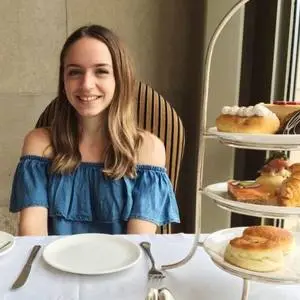I follow a lot of health blogs and Instagram pages and I’ve noticed more and more lately that people have been sprinkling bee pollen on top of their smoothie bowls or toast. I had a lot of questions. Why are people eating bee pollen? What benefits does it have? What does it mean for the bees?
It turns out bee pollen became popular around 2014 when Victoria Beckham tweeted about it. She allegedly takes it routinely to reduce signs of aging. Celebrities such as Kourtney Kardashian, Gwyneth Paltrow and Meghan Markle have also amped up the superfood in the media. Because of the recent re-emergence of this trend on my Instagram feed, I decided to look into what exactly all the buzz is about.
What is bee pollen?
Bee pollen is essentially bee food. Pollen is collected by bees from flowers, mixed with honey and other ingredients from the hive, and stored in sacs on their hind legs to carry from one flower to another. Once the bee has collected enough pollen, the mixture stored in their legs condenses into small granules. Bee keepers use devices to remove this pollen to be sold as a commercial food product for humans to eat.
The result is small crunchy yellow nuggets that can be added to dishes for texture. Many describe it as tasting “bitter sweet”. It can also be purchased in a less pure, capsule form.
Why are people eating it?
As the package in Victoria Beckham’s tweet explains, “Bee Pollen contains about 22 amino acids, 18 vitamins, 25 minerals, 59 trace elements, 11 enzymes or co-enzymes, 14 fatty acids, 11 carbohydrates and approximately 25% protein. It is extremely rich in carotenes and is high in B complex vitamins and Lecithin.”
People who swear by the substance claim a wide variety of benefits including reduced risk of cancer, energy boosts, cold curing, weight loss, and diminished signs of aging. Some also say that bee pollen, when taken in moderation, can help those with pollen allergies.
I decided to look into this a bit. As it turns out, these claims are largely not supported with concrete research, however, there is evidence supporting the nutritional make-up of the pollen. The exact makeup of the pollen is dependent on where the bee is collecting pollen, both region and flower species, so it is important to remember that not all brands of commercial bee pollen are equal in nutritional value.
What does it mean for the bees?
Bee pollen, being an animal product, is not vegan-friendly. My research tells me the process of collecting bee pollen granules can sometimes be adverse on the bees. Little information is available online about this topic, but it is dependent on the bee keeper and their commitment to the ethical treatment of the bees.
If you decide to try out bee pollen, it is generally safe to consume. However, you should consult with your doctor if you have a pollen or bee allergy or are pregnant or breastfeeding before introducing bee pollen into your diet. It is recommended bee pollen granules be stored in the refrigerator or freezer for the longest lifespan (up to a few years in the freezer) in a sealed container.


